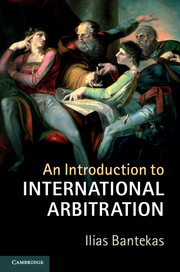Book contents
- Frontmatter
- Epigraph
- Contents
- Preface
- Table of cases
- Table of treaties
- Table of domestic laws
- Institutional Rules and Soft Law
- List of abbreviations
- 1 An introduction to international arbitration
- 2 The laws and rules applicable to arbitration
- 3 The agreement to arbitrate
- 4 The arbitral tribunal
- 5 Arbitration and the courts
- 6 The conduct of arbitral proceedings
- 7 Arbitral awards and challenges against awards
- 8 Recognition and enforcement of arbitral awards
- 9 Consumer and online arbitration
- 10 Investment arbitration
- Index
9 - Consumer and online arbitration
Published online by Cambridge University Press: 05 August 2015
- Frontmatter
- Epigraph
- Contents
- Preface
- Table of cases
- Table of treaties
- Table of domestic laws
- Institutional Rules and Soft Law
- List of abbreviations
- 1 An introduction to international arbitration
- 2 The laws and rules applicable to arbitration
- 3 The agreement to arbitrate
- 4 The arbitral tribunal
- 5 Arbitration and the courts
- 6 The conduct of arbitral proceedings
- 7 Arbitral awards and challenges against awards
- 8 Recognition and enforcement of arbitral awards
- 9 Consumer and online arbitration
- 10 Investment arbitration
- Index
Summary
Introduction
The subject matter of this chapter, particularly consumer arbitration, has not traditionally been included in textbooks on international arbitration because it is perceived as being of domestic concern only and not wholly relevant to commercial law. While this is true to a large degree, the author suggests several approaches which tend to show both its commercial and international character. Given the explosion of consumerism, both offline and online it is certainly prudent for those interested in arbitration to be aware of developments in consumer arbitration and its possible linkages to commercial arbitration. Consumer arbitration is a special form of arbitration, alongside commercial and investment arbitration. The chapter will go on to show how consumer arbitration and the underlying agreement to arbitrate consumer disputes have developed differently between EU and US lawmakers and the courts. We shall then attempt briefly to sketch the perilous waters of class arbitration before finally getting to grips with the operation and regulation of online arbitration, which is a hybrid (but not distinct) between consumer and commercial arbitration.
The nature of consumer disputes
Consumer disputes should be distinguished between business-to-consumer (B2C) and business-to-business (B2B). The reason why they are of concern is because the average consumer is at a disadvantage against the majority of businesses when it comes to dispute resolution. For one thing, there exists a significant financial disparity between businesses and their consumers. Secondly, the majority of consumers do not typically find it cost effective to institute proceedings against businesses, especially with respect to products and services whose value is relatively small. Thirdly, although the purchase of a product by a consumer may give rise to consumer arbitration in the event of dispute, it is unimaginable that even the most diligent of consumers would condition their purchase on the dispute resolution clause in their contract with the business. Where, for example, a consumer purchases a product in person or online the contract between seller and consumer is often indistinguishable from the receipt, a warrantee or (in the case of online purchases) the agreement of sale – typically appearing at the very end of the process – which requires a ‘tick’ by the consumer.
- Type
- Chapter
- Information
- An Introduction to International Arbitration , pp. 252 - 272Publisher: Cambridge University PressPrint publication year: 2015
- 1
- Cited by



